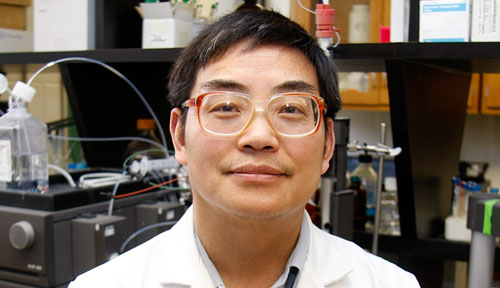Thanks to research at UNMC, the world might finally find a solution to the alarming rise of antibiotic-resistant bacteria.
The Japan-based Taisho Pharmaceutical Company agreed to sponsor additional research by Guangshun Wang, Ph.D., a UNMC microbiologist who may hold the answer to a new way to fight infections.
UNMC’s Sponsored Programs Administration and the UNMC technology transfer office, UNeMed Corporation, brokered the deal.
“We’re interested in partners who want to advance science and advance health care,” said Michael Dixon, Ph.D., president and CEO at UNeMed. “We’re very interested in developing partnerships on a global scale.”
Dr. Wang, an assistant professor at UNMC, is an expert in the design and evaluation of tiny proteins called peptides. He has developed a process to regularly review all reports and publications to find new sequences of peptides, and he catalogs them in a massive database.
The database can be used to find or even create peptides that have the potential for use as new medications, said Steve Hinrichs, M.D., chairman of the pathology and microbiology department at UNMC.
“Dr. Wang is a very special scientist,” Dr. Hinrichs said. “He has the rare ability to work in multiple areas including proteomics, information technology and microbiology.”
Fighting bacterial infections today presents a growing problem inherent within traditional antibiotic medication: Bacteria eventually develop a resistance to the medicine, resulting in stronger “superbugs.”
Peptides are an improvement over traditional antibacterial medications in at least one respect — bacteria are far less likely to develop a resistance.
It’s a novel approach to fighting infections, and one that might answer several alarms raised in recent months.
“Simply put, the antibiotic pipeline is on life support and novel solutions are required to resuscitate it — now,” said David Relman, M.D., president of the Infectious Diseases Society of America in an April 2013 interview with Reuters.
Dr. Wang at UNMC may have found that novel solution, and Taisho wants to help reload the pipeline with the next generation of effective antibacterial treatments.
“The key interest, for us, is it’s unlikely to cause a drug resistance,” said Toru Seo, Ph.D., deputy general manager at Taisho. “I think that’s where we see the leverage point using peptides.”
The concept of using peptides as an antibacterial agent is nothing new. But the technology to make it a practical reality is a much more recent development.
“The development of peptide therapeutics is a challenging task,” Dr. Wang said. “But it is on the frontier.”

Congratulations on your work, Dr. Wang!